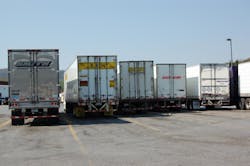Trying to gauge the portents for trucking is always something of a “is the glass half full or half empty” type of experiment.
I mean, there’s always something good going on right alongside something that’s not so good – and often they are the same thing, like low fuel prices.
Hey, lower fuel prices means less of an outright drain on trucking’s wallet, as we all know, but boy do many truckers miss the money they can make off of fuel surcharges when prices are higher (a classic example of the infamous “Catch-22” in action).
David Ross, one of the manager directors of the transportation capital markets research at Stifel Financial Corp., noted some other more worrisome trends taking shape for the trucking industry in a recent research brief – trends that parallel some of what occurred prior to the infamous Great Recession of 2007-2009; a cataclysmic economic event that many feel we still haven’t recovered from.
“Remember 2006? Oh, how things were seemingly so good in the U.S. Real estate values always went up! Freight was booming and carriers had pricing power for the first time since deregulation in 1980,” Ross said. “On top of that, JT was ‘bringing sexy back,’ MySpace was the most popular social networking platform, and nobody had yet heard of an iPhone.”But then the housing and automotive industry bubbles burst, freight activity took its “first big step down” in late 2006 through 2007, and as we all know, a lot of chaos followed.
Fast-forward to 2014, said Ross, where the oil and natural gas sector in the U.S. had become a major growth driver of the economy, with hydraulic fracturing (dubbed “fracking”) a major “game-changer” that enabled the U.S. not only to becoming relatively energy independent but position itself as the Saudi Arabia of the future.
Yet the downside is that fracking also helped trigger something of a crash in oil prices. And that crash is now resulting in a surge of energy sector bankruptcy filings similar to what occurred in the telecommunications industry back in 2002 and 2003.
“As this relates to freight, though, we believe the capital spending that drove a lot of [fracking] activity has already dried up and future filings will not make matters much worse,” Ross noted. “It is unclear, though, what may drive freight much higher from here other than job and wage growth.”
He added that the first quarter earnings season this year proved “unequivocally disappointing” as freight volumes continue to be hampered by elevated inThe strong U.S. dollar hasn’t helped either, despite having moderated some over the past few months. “That has hurt and continues to hurt the U.S. export economy, which is particularly significant for manufacturing-heavy freight sectors like rail and LTL,” Ross said.
“So, is this just a false start [with] growth postponed due to the inventory stockpiles? Or a sign that we are beginning another downslide? That is what the market is trying to figure out,” he pointed out.
Stifel believes that global economies will try to wring out a little more growth this year and that the potential for rising wages and infrastructure spending in the U.S. could lead to accelerating freight volumes too, once inventories are worked off.
So on the plus side, Ross thinks that if the U.S. continues a long, below-trend, uninspiring economic recovery, the truck driver shortage should then become more acute (due to a host of factors, such as new regulations) and that should drive freight rates up and motor carrier margins higher.But on the negative side, he said that if the U.S. enters a recession – and that’s not out of the cards – that will push freight volumes even lower, meaning the capacity shortages fail to materialize, leaving trucking in a tight spot.
Ross noted that several key metrics will indicate whether recovery or recession lays ahead for the U.S.: inventory levels, rail carloading data, and the performance of the ISM index.
Yet if increased demand does not lead to the next supply/demand tightening, could regulations further crimp the supply of drivers, pushing trucking rates significantly higher?
“While the regulations are on the way, they are coming slowly and can always be delayed, in our view,” Ross noted. “Nothing new on that front is expected this year [and] our general view is that if the regulations will take as much capacity out as feared and drive prices sky-high, the kick-the-can sentiment in [Washington] D.C. should once again take over and the regulations will be pushed out until the next time volumes decline, so it is more palatable for the shippers.”
Yet that will only make the next upturn that much better for truckers, in Stifel’s opinion.
All we can do right now, though, is wait; and often that’s the hardest part.






